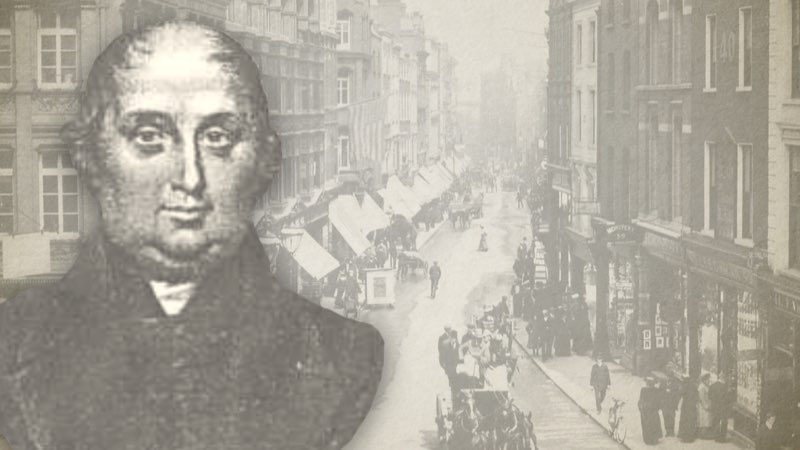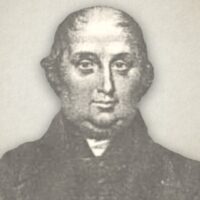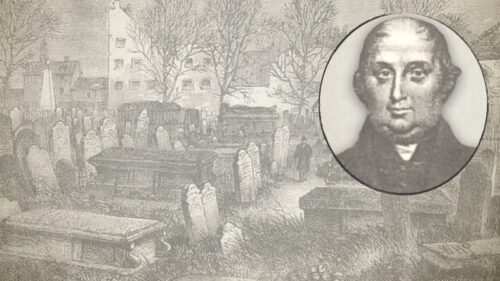
The Life And Ministry Of John Stevens
John Gadsby, “Memoirs Of The Principal Hymn-Writers And Compilers Of The 17th, 18th and 19th Centuries”:
John Stevens was born at Aldwinkle, Northamptonshire, June 8th, 1776. During his early years he resided with his grandfather, but subsequently went to his father’s, and learnt his business of a shoemaker. His father and family were all church people, and John, of course, attended church with them. “When about 10, he went to London, with a view of improving himself in his business; and there, it is believed, commenced his connection with dissenters. Referring to this period, and writing on the 8th of June, 1832, Mr. S. says, “This day I have been 56 years in this sinful world. I have been the subject of serious thoughts and desires more than 40 years.” In a little time after his arrival in London, he attended the ministry of Mr. Richard Burnham, Grafton Street, Soho, and was subsequently baptized by him. Not long afterwards, and when only 19, he “received the full sanction of the church, and was sent forth to preach the gospel as the Lord in his providence might open a door for him.” Nevertheless, from some cause or other, Mr. Burnham never would suffer him to preach in his pulpit. In about three years, Stevens returned to his native village, and there and in the neighborhood regularly preached. Dr. Haweis made proposals to procure his admission into the University; but Stevens would not consent, as his principles as a Baptist were fixed. In 1797 he accepted a call to settle over a people at Oundle. There he continued for two years, and then removed to St. Neot’s. Here he remained about five years, and during the time wrote the first part of his work against Fuller, entitled, “Help for the True Disciples of Immanuel,” a work good as far as it goes into the subject of particular redemption,—so good indeed that no Fullerite can ever answer it,—yet by no means to be compared with one upon the same subject by the late William Rushton, of Liverpool. In 1805, Mr. S removed to Boston, and remained there until 1811, when he accepted a call from the church in Grafton Street, London, Mr. Burnham being then deceased, to become their pastor. No less than 80 members, being nearly half the whole number, withdrew on Mr. S.’s settling amongst them; but, nevertheless, in little more than two years the place was found to be too small, and the people removed to York Street, St. James’s. In Dec, 1822, the church was broken up, the causes of which it would be uncharitable to mention, and many members left; but the next month it was reformed. In 1824 a new chapel was erected in Meard’s Court, at a cost of £4000; and in this Mr. S. continued to his death, there being at the time of that event, 400 members. In 1823 Mr. S. published a work in favor of the doctrine of purchased blessings and the sinner’s legal right to them. He was also an unflinching advocate of the Pre-Existerian theory, which tenet he seems to have held partly, if not principally, because he could not see how the human nature of Christ could be holy unless it were in existence before Adam fell; just as the Pagans of old could not worship a god which they could not see, and just as the Papists now-a-days believe that the Virgin Mary must have been immaculate, or Christ would have been contaminated with sin. A memoir of Mr. Stevens, consisting, with letters, &c., of nearly 400 octavo pages, was published soon after his death; but I know not who was the author. This is, however, certain, that Mr. S.’s best admirers may well be ashamed of it; for, if judgment must be pronounced upon Mr. S. according to the account therein given of him, his character could not stand very high amongst God-fearing people. The biographer has laboured more to prove that Mr. S. was a man of “distinguished, peculiar, and extraordinary ability” and “powerful and extraordinary talents,”—so powerful, indeed, and “singular and promising,” that even Richard Burnham was “jealous” of him; that “the native strength of his superior mind; manifested itself in the originality of his thoughts” nay, that his mind was so “singularly endowed with capabilities of thought and penetration,” that he was led by it “more fully to discover the sovereignty, &c, of a Triune Jehovah;” “that his powers of amplification were singularly great;” that “he rose with his theme to a lofty eloquence and sublimity of thought;” that he was, in a word, “a host in himself;” than that he was a helpless dependent upon the Holy Spirit,—a poor sinner saved by grace. Indeed, if we did not know to the contrary, one could hardly believe that he was a sinner at all, and certainly did not need more than half a Saviour, since he possessed a “great and holy mind,” and had “a latent principle of holy tendency in his heart from his youth.” No rightly-taught man need blush at being called an “Antinomian” by such a biographer, even though, through God’s mercy, he could fearlessly offer to compare notes with a life so “strictly moral,” “of such unyielding integrity, uncompromising faithfulness, undissembled godliness, and untiring devotedness and consecration to the cause of Jesus Christ,” as Mr. S’s was. All who knew Mr. S will, however, agree with the biographer that he was an unflinching advocate for the doctrines of grace, exceedingly powerful in argument, and that “few polemical writers employed the strength of logical argument with greater skill and success.” “‘I let them spin the cord,’ he was wont humorously to remark of some of his opponents, ‘with which I will presently tie their fingers.'” In the year 1809 Mr. Stevens published a work entitled, “Doctrinal Antinomianism Refuted, and the Old Law established in a New Relation.” This work was written against my dear father. Mr. S. maintained that even the saints in glory, in their perfect state as united to Christ, have nothing more than what the Law contains; to which my father replied that, if that were the case, it was impossible for the Gospel to produce or contain any one thing which is not found in the Law; that when Christ commissioned his disciples to go and preach the Gospel, he ought rather to have sent them to preach the Law; and that when the Apostle exhorted the church to let their conversation be as becomes the Gospel, he should have said as becomes the Law; for “what message more glorious can either men or angels ever deliver than that which contains all evangelical spirituality, holiness, justice, goodness, and truth?” The former said he saw no reason why the Gospel should be introduced as a law, in opposition to that commonly called the Moral Law; and the latter contended that it, the Moral Law, is not to a believer a perfect law, while the Gospel contains the glory, not only of the Moral Law, but of all the laws which God ever promulgated from his throne; that though the Law is in itself holy, and just, and good, snd glorious, yet that it has no glory, compared with the glory of the Gospel, which excelleth.” (2 Cor. 2:7-11.) Mr. S. called my father “Mr. Antinomos;” to which my father replied that he was quite willing, as to uprightness of conduct and integrity in all his dealings, to compare notes even with Mr. Stevens; and said if that man must be called an Antinomian who maintains that that Law is the believer’s rule which is highest in authority and most excellent, which not only contains all God’s laws, but excels all other laws in glory, he was quite willing to bear the reproach; “and though,” said he, “Mr. S has dipped his pen in nitre, I have no wish to be found walking by that rule; and if he is satisfied with the remarks he has made, I do not envy him his happiness…Precious Jesus! May my soul be truly humbled in the dust before thee,—a ruined sinner, justified freely by thy grace! a vile monster, complete in thee! In the riches of thy grace, visit me with a few more of thy heart-melting love kisses. Kiss me out of self more and more into thee!” Mr. S.’s last sermon was preached Sept. 19th, 1847. On the following Saturday, being very unwell, a friend called to see him, to whom he said, “I have no clothes of my own to appear in before God, but the garment of his righteousness, and have nothing to plead but the blood of his heart. I could wish the Lord would either give me strength for my work, or take me home to see his face in glory.” Little more is recorded of his last sayings; but his end is described as being “prayerful, calm, and peaceful,” “not a word of distrust or doubt escaping him.” He died Oct. 6th, 1847.
John Stevens (1776-1847) was a Strict and Particular Baptist preacher. In 1811 he was appointed pastor of the church meeting at Grafton Street, London. He is the author of “Help For The True Disciples Of Immanuel”, a work which uproots the pernicious teachings of Andrew Fuller. However, throughout the course of his ministry, he entertained some dangerous ideas. Foremost was the notion that the human nature of Christ is pre-existent, a position that cannot be maintained scripturally or logically. In 1809, he also published “Doctrinal Antinomianism Refuted, And The Old Law Established In A New Relation.” This book was written in opposition to William Gadsby’s position that the gospel is the rule of conduct for the believer’s life, not the moral law. However, rather than overthrowing Gadsby’s teachings, he wound up undermining the gospel he sought to defend. Nevertheless, in the whole, Stevens “was an unflinching advocate for the doctrines of grace”.




